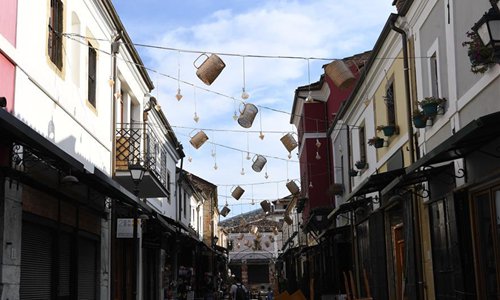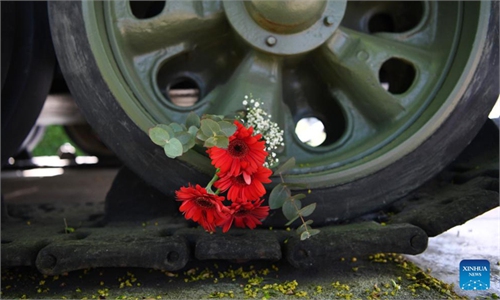
Photo taken on Aug. 17, 2019 shows a street decorated with beer mug models during the Korca Beer Festival in Korca, Albania. (Xinhua/Zhang Liyun)
The 38-year-old farmer owns only half a hectare in the town of Mamurras in Albania, but even still is unable to afford the chemical-based fertilizers imported from abroad.
As in other parts of the world, Albania's agricultural sector has been battered by rising costs, with fuel and fertilizer prices soaring.
To curb expenditures, Cakalli has turned to coffee grounds, a natural fertilizer with readily available stocks in Albania, where drinking the caffeinated beverage remains a national pastime and cafes dot nearly every corner. On an average day, Cakalli says he is able to collect up to 40 kilograms of coffee grounds.
The process is time-consuming, requiring him to first collect the used beans before mixing the grounds with herbs and later composting the concoction for three months. But the final product is "rich in nitrogen, magnesium and potassium and is a good substitute for chemical fertilizers" and "repels insects," says Cakalli.
According to experts, fertilizers and fuels account for more than 45 percent of the costs in agricultural production in the country.
By switching to coffee grounds, Cakalli says that he saves between 1,500 and 2,000 euros ($1,550 and $2,070) every year.
As COVID-19 disrupted global trade, he has also diversified his operations in the field. He now focuses on growing exotic crops, including passion fruit and goji berries, after the import of the fruits from South America were stopped during the pandemic just as demand began to rise.
"These fruits were in high demand because they are known to help boost the immune system and for their antioxidant properties," says his wife Juli, a 34-year-old nurse.
"People like them a lot, their smell is fantastic and even better than those of the countries of origin because everything is fresh here," says Cakalli.
AFP


